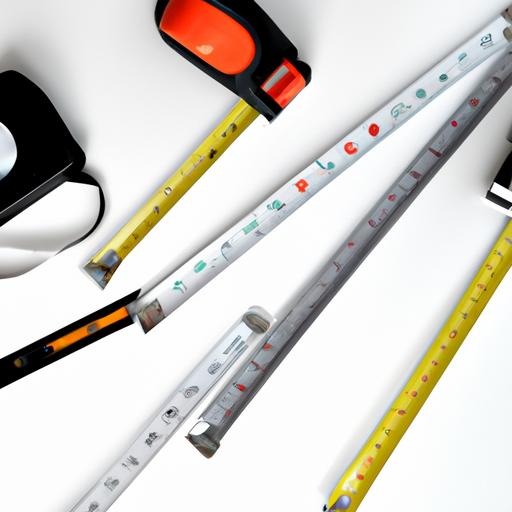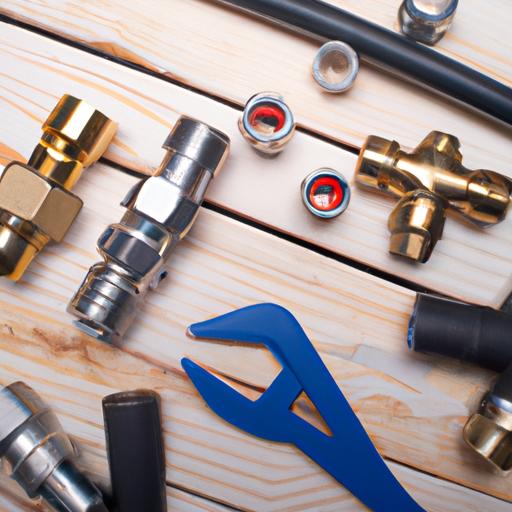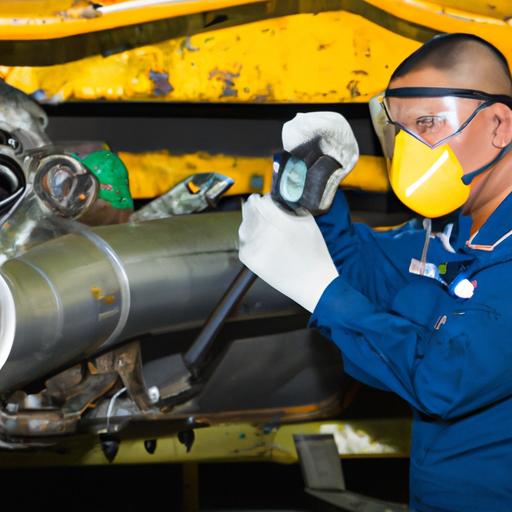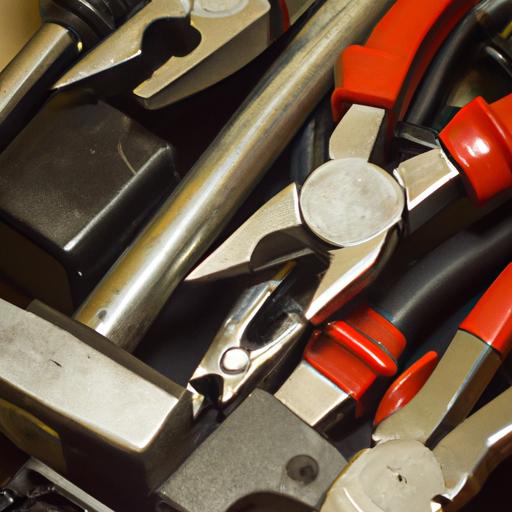In our fast-paced world, accuracy and precision are paramount in various industries. Whether you’re a carpenter crafting a beautiful piece of furniture or an engineer designing a complex structure, reliable measurements are essential. This is where common measuring tools and equipment come into play. In this article, we’ll explore the significance of these tools, their diverse applications, and the impact they have on different sectors.
Defining Common Measuring Tools and Equipment
Common measuring tools and equipment encompass a wide range of devices that enable us to quantify and evaluate dimensions, quantities, and properties. These tools are designed with precision in mind, allowing for accurate and consistent measurements. From simple handheld rulers to sophisticated digital instruments, they are employed across various industries, including construction, manufacturing, science, and healthcare.
The Role of Common Measuring Tools and Equipment
The importance of these tools cannot be overstated. They serve as the foundation for quality assurance, ensuring that products and structures meet stringent standards. Without accurate measurements, buildings would lack stability, machines would malfunction, and experiments would yield inconclusive results. They provide the necessary data for decision-making, allowing professionals to optimize processes, reduce waste, and enhance efficiency.
Let’s delve deeper into the world of common measuring tools and equipment, exploring their types, applications, factors to consider when choosing them, proper maintenance practices, and their impact on different industries. By the end of this article, you’ll have a comprehensive understanding of these indispensable tools, empowering you to make informed choices and achieve remarkable precision in your endeavors.
Types of Measuring Tools and Equipment
When it comes to measuring tools and equipment, there is a vast array of options available to cater to different needs and requirements. Let’s explore some of the most common types:
1. Measuring Tapes and Rulers
Measuring tapes and rulers are ubiquitous tools used for linear measurements. Their flexibility and ease of use make them ideal for a wide range of applications, from carpentry and construction to sewing and crafting.
2. Calipers and Micrometers
Calipers and micrometers are precision instruments used to measure dimensions with utmost accuracy. These tools excel in applications that demand precise measurements, such as machining, engineering, and scientific research.
3. Gauges and Indicators
Gauges and indicators are vital tools for assessing various parameters, including pressure, temperature, and thickness. They are commonly used in automotive, manufacturing, and quality control industries to ensure compliance with specific standards.
4. Protractors and Angle Finders
Protractors and angle finders are indispensable for measuring and marking angles. They are frequently employed in fields like architecture, metalworking, and woodworking to achieve precise angles and ensure proper alignment.
5. Levels and Inclinometers
Levels and inclinometers are essential for maintaining balance and determining slopes. From construction and surveying to plumbing and landscaping, these tools help professionals achieve accurate vertical and horizontal alignments.
6. Thermometers and Hygrometers
Thermometers and hygrometers play a crucial role in measuring temperature and humidity, respectively. They find applications in various industries, including food production, HVAC, and environmental monitoring.
7. Mass and Weight Measurement Tools
For precise weight measurements, scales and balances are utilized in industries such as manufacturing, pharmaceuticals, and agriculture. These tools ensure accurate measurements of mass, helping to maintain quality and adhere to regulations.
8. Timekeeping and Timing Devices
Timekeeping tools, such as clocks, timers, and stopwatches, are indispensable in fields where accurate time measurement is crucial. From sports events to scientific experiments, these devices ensure precise timing and synchronization.
By understanding the different types of measuring tools and equipment available, professionals can select the most suitable options for their specific applications. Each tool serves a unique purpose, contributing to the overall precision and efficiency of various industries.
Applications and Uses
When it comes to common measuring tools and equipment, their applications span across various industries, each relying on precise measurements for different purposes. Let’s explore some of the key sectors where these tools find invaluable use:
Construction and Woodworking
In the realm of construction and woodworking, accurate measurements are crucial for ensuring structural integrity and creating aesthetically pleasing designs. Measuring tapes, rulers, levels, and angle finders play a vital role in determining dimensions, marking cut lines, and aligning components. From erecting sturdy buildings to crafting intricate wooden furniture, these tools enable precise measurements that bring visions to life.
Engineering and Manufacturing
Engineers and manufacturers heavily rely on measuring tools and equipment to ensure precise production processes. Calipers, micrometers, and gauges assist in measuring tolerances, verifying part dimensions, and conducting quality control inspections. These tools enable engineers to design intricate mechanical systems and manufacturers to produce precise components, contributing to the overall efficiency and reliability of machinery.
Automotive and Aviation
In the automotive and aviation industries, precision is paramount for safety and performance. Measuring tools such as torque wrenches, feeler gauges, and dial indicators aid in engine assembly, suspension alignment, and aircraft maintenance. Accurate measurements of clearances, torque values, and alignment angles ensure optimal functioning and minimize risks, guaranteeing smooth rides and safe flights.
Science and Research
In scientific research, obtaining accurate measurements is essential for valid experimentation and data analysis. Scientists utilize specialized measuring tools like thermometers, hygrometers, and spectrophotometers to measure temperature, humidity, and light intensity, respectively. These tools help researchers monitor environmental conditions, gather reliable data, and draw meaningful conclusions, advancing scientific knowledge and discoveries.
Cooking and Baking
Even in the culinary world, precision plays a vital role in achieving culinary masterpieces. Measuring cups, spoons, and kitchen scales ensure accurate ingredient proportions, resulting in perfectly balanced flavors and textures. Whether you’re a professional chef or a home cook, these tools help you follow recipes and create delightful dishes that tantalize taste buds.
Medical and Healthcare
In the medical and healthcare fields, precise measurements are essential for accurate diagnoses and proper patient care. Measuring tools like blood pressure monitors, thermometers, and weight scales aid in monitoring vital signs and tracking patient health. Accurate measurements enable healthcare professionals to make informed decisions and provide appropriate treatments, ensuring the well-being of individuals.
From construction and engineering to science and healthcare, common measuring tools and equipment are indispensable across a multitude of industries. Their applications and uses are diverse, enabling professionals to achieve precision and efficiency in their respective fields. By harnessing the power of these tools, we can build, create, and innovate with confidence and accuracy.
Factors to Consider When Choosing Measuring Tools
When it comes to selecting measuring tools, several factors should be taken into account. These considerations will ensure that you choose the right tools for your specific needs, guaranteeing accurate and reliable measurements. Let’s explore these essential factors:
Accuracy and Precision Requirements
The level of accuracy and precision required for your measurements is crucial in determining the appropriate tools. Different applications may demand varying levels of precision, so it’s essential to assess your specific requirements before making a choice. For highly precise tasks, tools like calipers and micrometers are ideal, while less demanding tasks may only require a standard measuring tape.
Durability and Quality of Materials
Measuring tools should be built to withstand regular use and potential harsh conditions. Opt for tools made from durable materials that can resist wear and tear. Stainless steel and hardened plastics are commonly used for their durability. Investing in high-quality tools ensures longevity and accurate measurements over time.
Ease of Use and Convenience
Consider the ease of use of the measuring tools you’re considering. Ergonomic designs, clear markings, and user-friendly features can make a significant difference in your workflow. Tools that are intuitive and comfortable to handle will enhance efficiency and reduce the chances of errors.
Cost-Effectiveness and Budget Considerations
Budgetary constraints are a reality for many individuals and businesses. It’s important to strike a balance between quality and cost-effectiveness. While it can be tempting to opt for cheaper alternatives, compromising on quality may lead to inaccurate measurements and additional costs in the long run. Evaluate your budget, compare prices, and prioritize tools that offer a good balance of quality and affordability.
Compatibility with Specific Applications
Different industries and tasks require specific measuring tools tailored to their unique needs. Consider the compatibility of the tools with your intended applications. For example, construction professionals may require tools that can measure angles accurately, while scientists may need tools that provide precise temperature readings. Ensure that the tools you choose are suitable for the tasks at hand.
By carefully considering these factors, you can make informed decisions when selecting measuring tools. Remember, choosing the right tools will not only enhance the accuracy of your measurements but also improve your overall productivity and efficiency.
Proper Maintenance and Calibration
Importance of Regular Maintenance
To ensure the longevity and accuracy of your measuring tools and equipment, regular maintenance is crucial. Just like any other tools, they require proper care to perform optimally. Regular maintenance not only extends their lifespan but also guarantees reliable and precise measurements.
Cleaning and Storage Guidelines
One of the fundamental aspects of maintenance is keeping your measuring tools clean and properly stored. Dust, debris, and moisture can affect their performance, leading to inaccurate readings. After each use, wipe them down with a clean, dry cloth to remove any residue. Additionally, store them in a designated case or toolbox to protect them from potential damage and environmental factors.
Calibration Procedures and Frequency
Calibration is the process of comparing the measurements of a tool against a known standard to ensure accuracy. Over time, measuring tools can drift from their original calibration due to wear and tear. Therefore, it’s essential to calibrate them periodically. The frequency of calibration depends on the type of tool, its usage, and the industry requirements. Some tools may require calibration every few months, while others may only need it annually. Consult the manufacturer’s guidelines or industry standards to determine the appropriate calibration schedule.
Ensuring Accurate Measurements Through Proper Care
By adhering to proper maintenance practices and calibration procedures, you can ensure that your measuring tools consistently provide accurate measurements. Regular maintenance helps identify any wear, damage, or issues that may affect the tool’s performance. It allows you to address these concerns promptly, ensuring that your measurements remain precise and reliable.
Remember, accurate measurements are the cornerstone of success in various industries. By taking the time to maintain and calibrate your measuring tools, you not only guarantee their longevity but also uphold the integrity of your work. Invest in proper care, and your measuring tools will continue to be indispensable assets in your pursuit of excellence.
Conclusion
In conclusion, common measuring tools and equipment play a crucial role in a multitude of industries, enabling professionals to achieve accuracy and precision in their work. From construction and manufacturing to healthcare and research, these tools provide the necessary measurements for quality assurance and optimal performance.
By understanding the different types of measuring tools available, such as tapes, calipers, gauges, and thermometers, individuals can select the most suitable instruments for their specific applications. Factors like accuracy requirements, durability, ease of use, and cost-effectiveness should be considered when making these choices.
Proper maintenance and regular calibration of measuring tools are essential to ensure accurate and reliable measurements. Adhering to cleaning, storage, and calibration guidelines helps maintain the integrity of the tools and guarantees precise results.
The impact of accurate measurements goes beyond individual projects. Industries rely on the data provided by these tools to drive innovation, improve processes, and meet regulatory standards. From constructing safe buildings to developing groundbreaking technologies, precise measurements are the foundation of progress.
So, whether you’re a professional in a specialized field or an enthusiast pursuing a hobby, understanding and utilizing common measuring tools and equipment will undoubtedly enhance your precision and efficiency. Embrace the power of these tools, and unlock the potential for remarkable achievements in your endeavors.
Remember, the world is built on measurements, and with the right tools in your hands, you have the power to create something extraordinary.



